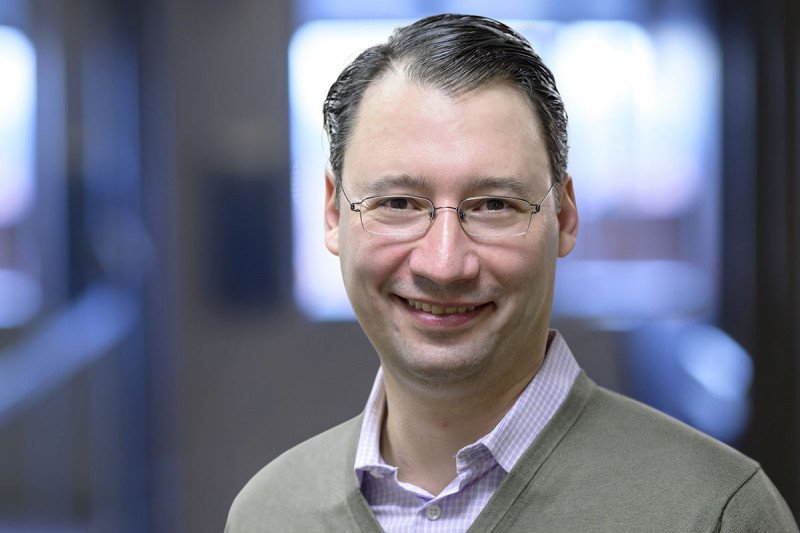
Physician-scientist Alex Kentsis leads MSK’s new Tow Center for Developmental Oncology, which is focused on learning more about cancers that affect both children and young adults.
Disruption in the way genes turn on and off can cause tumors to grow and proliferate uncontrollably. Blood cancers in particular are characterized by a high level of disorder in gene control. How this chaos develops has not been well understood until recently.
Researchers from Memorial Sloan Kettering recently found that a protein called MYB (pronounced “mib”) is responsible for changes in gene regulation across a range of cancers, especially most kinds of myeloid leukemia, according to a study published February 2, 2021, in the journal eLife. Importantly, the researchers also report they have created a molecule that can block this activity and restore cancer cells to normal behavior. They are now working to turn this molecule into a drug that could eventually be tested in clinical trials.
“Dysregulated gene control has been recognized as a central hallmark of blood cancers,” says physician-scientist Alex Kentsis, the senior author of the new study, who leads a lab in the Sloan Kettering Institute’s Molecular Pharmacology Program. “But despite knowing this, strategies to restore normal gene control have been elusive. The ability to accomplish this is one of the key discoveries from this research.”
Specific or Sweeping? Two Strategies to Destroy Cancer
Personalized medicine has become a familiar concept in cancer treatment in recent years. It’s based on the idea that the more we learn about the underlying causes of each individual patient’s cancer, the more customized a therapy can be. But the downside to this approach is that — due to the dozens of subtypes for many cancers, including myeloid leukemias — finding a drug for every one of them is a huge task.
For that reason, it’s also important for scientists to continue looking for drugs that can be broadly applicable to many cancer subtypes. Dr. Kentsis believes his research could lead to one such drug. “The challenge in providing targeted treatments has been finding ways to address the ever-expanding number of leukemias and other cancer subtypes,” he says. “Our new work suggests there could be a shortcut by finding an underlying fundamental target that could be relevant for many, if not most of them, while sparing healthy cells.”
One Drug Target to Rule Them All
MYB has been recognized as an important factor in cancer for decades. But until recently, researchers didn’t know how this protein, which also exists in normal cells throughout the body, becomes co-opted in a way that allows it to drive the formation of cancer.
It turns out that MYB is required for the growth and survival of most forms of leukemias. It’s also found in some lymphomas and solid tumors, including breast and colon cancers, and a rare type of head and neck cancer called adenoid cystic carcinoma. In all of these cancers, MYB gets activated in such a way that it acts as a kind of master controller, allowing gene activity to become altered so that it encourages cells to grow out of control.
Once Dr. Kentsis and his colleagues zeroed in on the role of MYB, they set out to find a way to stop its activity. Using structural biology and computer-assisted modeling, they created a molecule that was able to block the activity of MYB preferentially in cancer cells.
“This molecule does not yet have the characteristics that would make it suitable for use in people, but we hope to use it as the basis for designing new drugs that could ultimately be tested in clinical trials,” Dr. Kentsis says.
Making a Plan: Converging on a Mechanism Found in Many Cancers
“Thanks to this work, we now have a playbook that explains how different types of leukemia and some other cancers converge on a similar kind of gene-control disruption that’s caused by MYB,” he explains. “This includes leukemias in childhood that are due to errors that arise during development and leukemias found in older people that are caused by aging or environmental exposures.”
Dr. Kentsis, a pediatric oncologist, explains that this type of convergent research is precisely the reason for the establishment of the newly created Tow Center for Developmental Oncology at MSK, which he leads. The Tow Center is focused on research into the molecular mechanisms and therapies of cancers that affect both children and young adults.
Because MYB appears to also play a role in many adult cancers, these findings have broad implications. “We want to understand the universal rules that control cancers, so that we can develop therapies that could work for many different types of cancers for most people,” Dr. Kentsis says.
The co-first authors on the study were Sumiko Takao and Masahiro Uni, research fellows in the Kentsis lab, and Lauren Forbes, a former graduate student.









